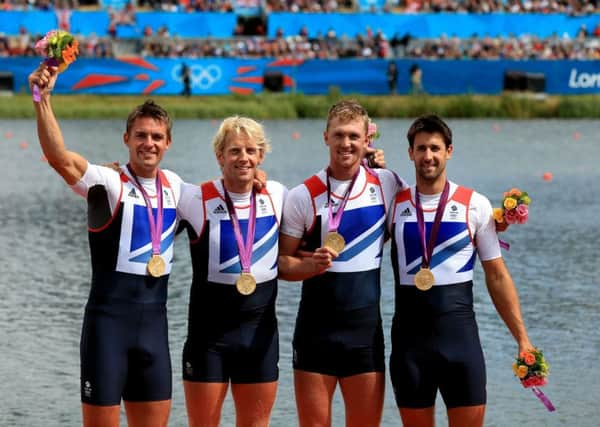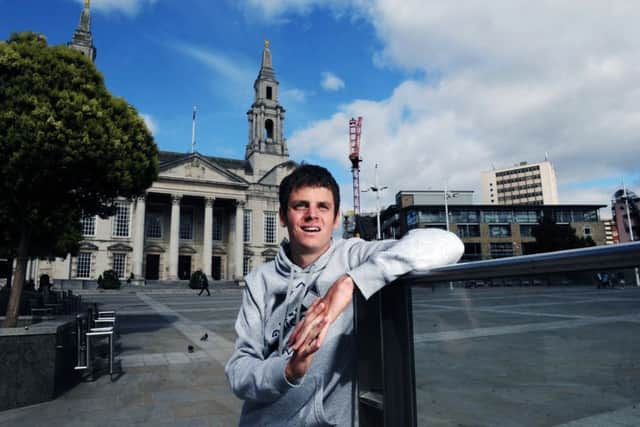Yorkshire’s Olympic stars speak out on the Russian doping scandal


THIS unseasonably mild November afternoon finds Andrew Triggs Hodge MBE amid familiar surroundings.
The Redgrave Pinsent Rowing Lake, a tranquil 2,000-metre stretch of water a short drive from Reading, is where he honed his stroke as he geared up for London 2012.
Advertisement
Hide AdAdvertisement
Hide AdThat journey culminated in him climbing on to the podium as a double Olympic gold medal winner, following on from his triumph as part of Great Britain’s coxless four in Beijing four years earlier.


But for Triggs Hodge, who was brought up in the North Yorkshire village of Hebden, thoughts that were focused on his training for next year’s Rio Olympics have been joined by fears for the future in the wake of the doping allegations that have rocked athletics.
A prominent member of UK Anti-Doping’s athlete committee, the national organisation dedicated to protecting a culture of clean competition, the 36-year-old finds it a struggle to keep the hurt out of his voice as he reflects on what he calls a “gut punch” for world sport.
“I get to see a lot of the really positive work that’s being done in terms of fighting doping in this country,” he says. “You feel that we’re getting somewhere and I guess it gives you a false sense of security. Then you hear these allegations... and it all comes crashing down.”
Advertisement
Hide AdAdvertisement
Hide AdThis week’s bombshell report by the World Anti-Doping Agency (Wada) claims that corruption is endemic in the testing of athletes in Russia.
It says state secret police posed as staff at a key testing laboratory, positive samples were destroyed before a Wada visit and systematic bribery by Russian athletes and coaches ensures their doping practices stay under the radar.
Taking in the events of a whirlwind couple of days, Triggs Hodge admits he is shocked, that he thought the widespread cheating which dogged the Olympics and World Championships in the 1980s and 90s had been consigned to the past. These fresh claims have blown such hopes out of the water.
For the most part, rowing has escaped the attentions of drug cheats because it’s simply not lucrative enough, but he recalls a case of Russian rowers being caught after syringes were discovered at their hotel.
Advertisement
Hide AdAdvertisement
Hide AdTellingly, it was a maid who found them dumped in a bin, not the organisation tasked with rooting out those who rely on stimulants, and blood boosters to enhance their performance.
He believes the key problem is a lack of funding for Wada which leaves the agency operating with one hand tied behind its back.
“I think they’re doing a good job within their means but they’re stretched budget wise. As for the IAAF (world governing body the International Association of Athletics Federations), they don’t have enough money to monitor these things as well as they should either.
“We need to be a lot tougher on cheats – lifetime bans rather than just four years – but the IAAF needs to be restructured with better resources and professional managers.”
Advertisement
Hide AdAdvertisement
Hide AdJonny Brownlee is currently pounding the hills of his native West Yorkshire on bike and two feet in preparation for Rio, where he hopes to improve on the triathlon bronze medal he claimed behind his brother Alistair in London.
“Obviously we had heard rumours for the last few months but the scale of it is definitely a shock,” he says, reflecting on revelations which Russia insists are groundless.
“I think it’s good that it’s all coming out, hopefully it can be dealt with and we can put it behind us and move on.
“I can only talk about my sport and in triathlon it’s something that’s been talked about very little.”
Advertisement
Hide AdAdvertisement
Hide AdAs far as calls for a blanket ban on Russian participation next year, he’s not sure it’s the answer.
“It’s a difficult one because the scale of it is massive in Russia, or at least it seems to have been,” says Brownlee. “Obviously there needs to be some form of punishment but banning them completely may be a bit too harsh and I’m not sure it’s the right way to go about it.
“What makes it so difficult is that this is the first time we’ve really had claims of widespread government involvement in doping. I just hope it doesn’t turn people away from athletics because it’s a great sport and there are incredible athletes out there – and the majority of them are clean.”
Triggs Hodge agrees that a blanket ban on Russian athletes in Rio would be too draconian.
Advertisement
Hide AdAdvertisement
Hide Ad“We’ve got to keep it factual, we can’t go on hearsay and we need time for a proper investigation. This report has gone a long way down the line but it needs to be checked. But if it’s confirmed that systematic doping was going on then we’ve got to go in heavy.
“I support life bans for athletes caught doping – I just don’t think there is any room to allow doping in sport. But as an athlete there are two clear camps – those who deliberately set out to cheat and those who aren’t given the choice and it’s forced upon them by those around them. Banning that group wouldn’t be fair in my eyes.
“The way I see it, the people around these athletes are the ones who can make a real difference – the brothers, sisters and friends who have to stop turning a blind eye. If you’re doping it’s very hard to hide it from your family or neighbours. Those people have more sway than Wada, because they see these athletes every day, and they need to challenge them.
“If we make it completely unacceptable to dope then we can make sure the sport is clean.”
Advertisement
Hide AdAdvertisement
Hide AdAs someone who was denied a podium appearance because of a drugs cheat, former javelin thrower Mick Hill unsurprisingly has strong views on the issue.
The Leeds athlete won bronze at the 1993 World Championships but was only awarded it retrospectively when the original medalist, Dmitriy Polyunin of Uzbekistan, tested positive for anabolic steroids.
“It’s knocked me for six,” says Hill, sitting in his office at Leeds Beckett University where he is now a high performance coach with Jess Ennis-Hill among his former students.
“You expect the IAAF, as custodians of the sport, to be on top of it and instead there are claims that they turned a blind eye.
Advertisement
Hide AdAdvertisement
Hide Ad“It leaves a nasty taste in the mouth and you feel for those who have been kept out of teams and off podiums because of this, some of them British athletes.
“There’s talk of Russia not being at Rio. I’m all for banning people who have done something wrong, but if you ban Russia full stop you run the risk of banning the clean athletes – assuming there are some in Russia.
“I want (former IAAF president) Lamine Diack to now come out and tell the truth as to how much he knew. We may not like it, but otherwise the rumour and innuendo will go on damaging the sport.”
Back in Berkshire, it’s almost time for Andrew Triggs Hodge to head back to his training, but before he goes he has one further thought, one more insight into where his head is at.
Advertisement
Hide AdAdvertisement
Hide Ad“I do this sport because I love it, because it feels right and I’ve got something to prove,” he says. “We have to trust the agencies to do their job and catch the cheats.
“And anyway,” he adds, “if I said I was done with it and hung up my oars because there were too many cheats out there then I’d be letting them win.”
The five biggest doping scandals
September 1988 – Canadian sprinter Ben Johnson is stripped of his gold medal at the Seoul Olympics.
July 1998 – The Tour de France is hit by the Festina affair, a series of doping scandals initially focusing on the Festina cycling team but quickly spreading to several others.
Advertisement
Hide AdAdvertisement
Hide AdOctober 2003 – British sprinter Dwain Chambers tests positive for banned steroid THG in an investigation which also exposes US runners Marion Jones and Tim Montgomery.
June 2012 – After years of angry denials, seven-time Tour de France winner Lance Armstrong admits using performance enhancing drugs.
December 2014 – A German TV documentary claims 99 per cent of Russian athletes are guilty of doping, sparking this week’s report which has supported the allegations.